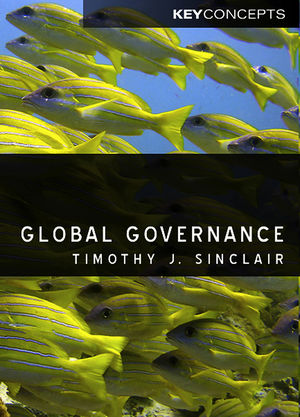
In today’s uncertain world, the concept of global governance has never been more relevant or widely discussed. But what does this elusive idea really mean, and why has it become so important? Timothy J. Sinclair seeks to guide readers through the key perspectives on this crucial topic. Martin Hearson finds a richly referenced and authoritative text in many places, and recommends the book for its clear structure, easy prose, and references to many key papers.
 Global Governance (Key Concepts in the Social Sciences series). Timothy J. Sinclair. Polity Press. September 2012.
Global Governance (Key Concepts in the Social Sciences series). Timothy J. Sinclair. Polity Press. September 2012.
Some of the most exciting questions in international relations today relate to global governance. Is the rise of China, India, and other large economies going to shake up the established world power order? Is there any hope of finding a global solution to avert climate change, or is that already too late? Have our governments done enough to prevent another international financial crisis on the scale of 2008?
What you think global governance can achieve depends of course on what you think it is. Is it about hard law, soft law, international organisations, more subtle behavioural norms? Interactions between states, or between a broader set of actors including businesses and advocacy networks? How does power work in international institutions, and with whom does it reside? Much interesting, cutting-edge work in international relations aims to understand when, how and why international institutions make a difference to what states do.
Timothy J. Sinclair’s book is an attempt to provide an accessible guide to the different schools of thought on global governance, firmly grounded in a discussion of some of its defining issues. The body of the book is divided into six chapters, each profiling a different conceptual framework through which global governance is understood. In each he works systematically through a set of characteristics such as assumptions, ontology, and level of analysis. This is effectively the prose version of a matrix, in which each column is a school of thought, and each row is a different characteristic.
The underlying argument is that “the impetus behind the debate about global governance has its origins in the policy world” and hence “is a limited managerial view of the world.” To demonstrate this, the first column in his matrix is a “depoliticised” institutionalist school of thought, dominated by technocrats. “For them, global governance is part of a practical way of thinking about the problems they are trying to solve”, and politics is merely an obstacle to achieving this. As a tendency in academic thought, this category might well exist, but Sinclair’s assertion is about the technocratic world-view and it is more assumed than demonstrated. I had some trouble squaring it with my own experience of dealing with ‘technocrats’ in global governance institutions.
Also puzzling was the way in which the inclusion of norms as an explanatory variable was limited to the chapter on “transnationalism”, as if transnational advocacy networks are the only sources of and transmitters of norms. While this is part of the story, academic work on the diffusion of norms seems to suggest that states themselves can be norm entrepreneurs that norms can diffuse from state to state, and that in other cases norms can be forged and transmitted among diplomats and bureaucrats in international organisations.
Sinclair does a better job in some chapters than others of demonstrating that he’s accurately portraying a major way of thinking. He seems more comfortable discussing cosmopolitanism and hegemonism (his term for certain schools of Marxist thought) with which he evidently identifies himself. His introductory chapter on the emergence of global governance as a field is also richly referenced and authoritative.
The book also portrays a broader scope of analysis than many discussions of global governance, which tend to limit the story to the rationalist versus constructivist debate (which is present here, more as a theme running throughout). In particular, the inclusion among the six ways of seeing global governance of feminism is a thought-provoking way of bringing this aspect to the table. This chapter was incredibly light on references – Sinclair says that “not a lot of good research has been completed” in this area yet, but his sections outlining what feminists think would have benefited from some reference to the actual feminist literature that makes the arguments that he attributes. That literature does exist – for example, a lot has been written about gender and the governance of world trade.
Overall, I found the book’s matrix-based structure helpful for easy comparability across the chapters, but I get the feeling that it both reduced the potency of Sinclair’s argument, and forced him to shoehorn in debates that are not between columns but between rows, or even somehow diagonal. Are bureaucratic institutions political or merely technical actors? What is the role of norms in international relations? Can global governance be modelled through game theory, and if so, which type of games? Interestingly, game theory, a major influence on global governance debates, is entirely absent from the book.
One innovation of the book is the inclusion of vignettes at the end of each chapter in which two families from the United States and India discuss particular issues (climate change, financial crisis, etc.) through each of the six lenses on global governance. This didn’t do much for me, but perhaps it would be illuminating for an audience fresh to these debates. Indeed, the whole book, with its clear structure, easy prose, and references to many of the key papers, would be a good introductory text so long as the reader questions its overarching structure.
———————————————————
Martin Hearson is a doctoral researcher in the international relations department of the London School of Economics and Political Science. With a background working in advocacy for international NGOs, he now focuses on the political economy of international taxation in developing countries. Read more reviews by Martin.







